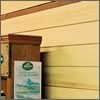|
|
||||
|
|
American willow (Salix spp.)Other names: Black willow, swamp willow
Click to enlarge DistributionEastern USA. Principal commercial areas are the Middle and Southern States, along the Mississippi river. General descriptionThe sapwood of willow varies in width according to growing conditions and is light creamy brown in colour. In contrast the heartwood is pale reddish brown to greyish brown. The wood has a fine even texture and although generally straight grained it can sometimes be interlocked, or display figure. Working propertiesWillow works fairly easily with hand and machine tools but care is needed to avoid a fuzzy surface when interlocked grain is present. The wood nails and screws well, glues excellently, and can be sanded and polished to a very good finish. It dries fairly rapidly with minimal degrade although may be susceptible to moisture pockets. Dimensional stability is good when dry.
Physical propertiesThe wood is weak in bending, compression, shock resistance and stiffness, with a poor steam bending classification. Specific Gravity: 0.39 (12% M.C.) DurabilityNon-resistant to hardwood decay. The heartwood is resistant to preservative treatment and the sapwood is permeable. AvailabilityUSA:Reasonable availability on a regional basis, as lumber and
veneer. Main usesFurniture, joinery, interior mouldings, panelling, doors, sports equipment, kitchen utensils and toys.
|
|
||||||||||||||||||||||||||||||||||||||||||||||||||||||||||||||||||||||||||||




